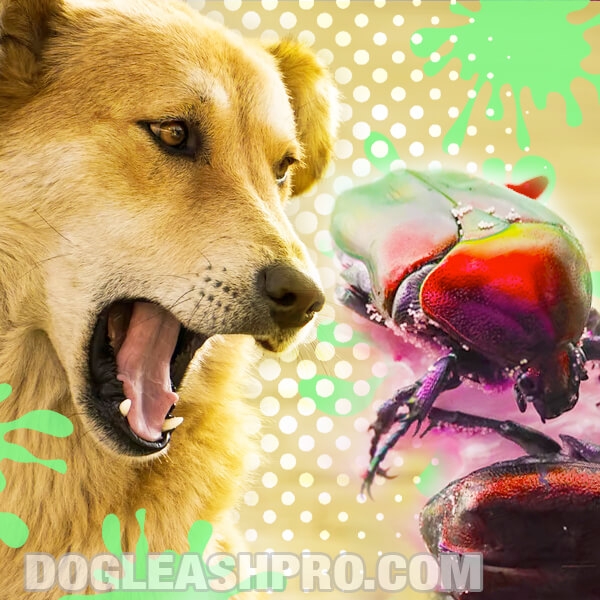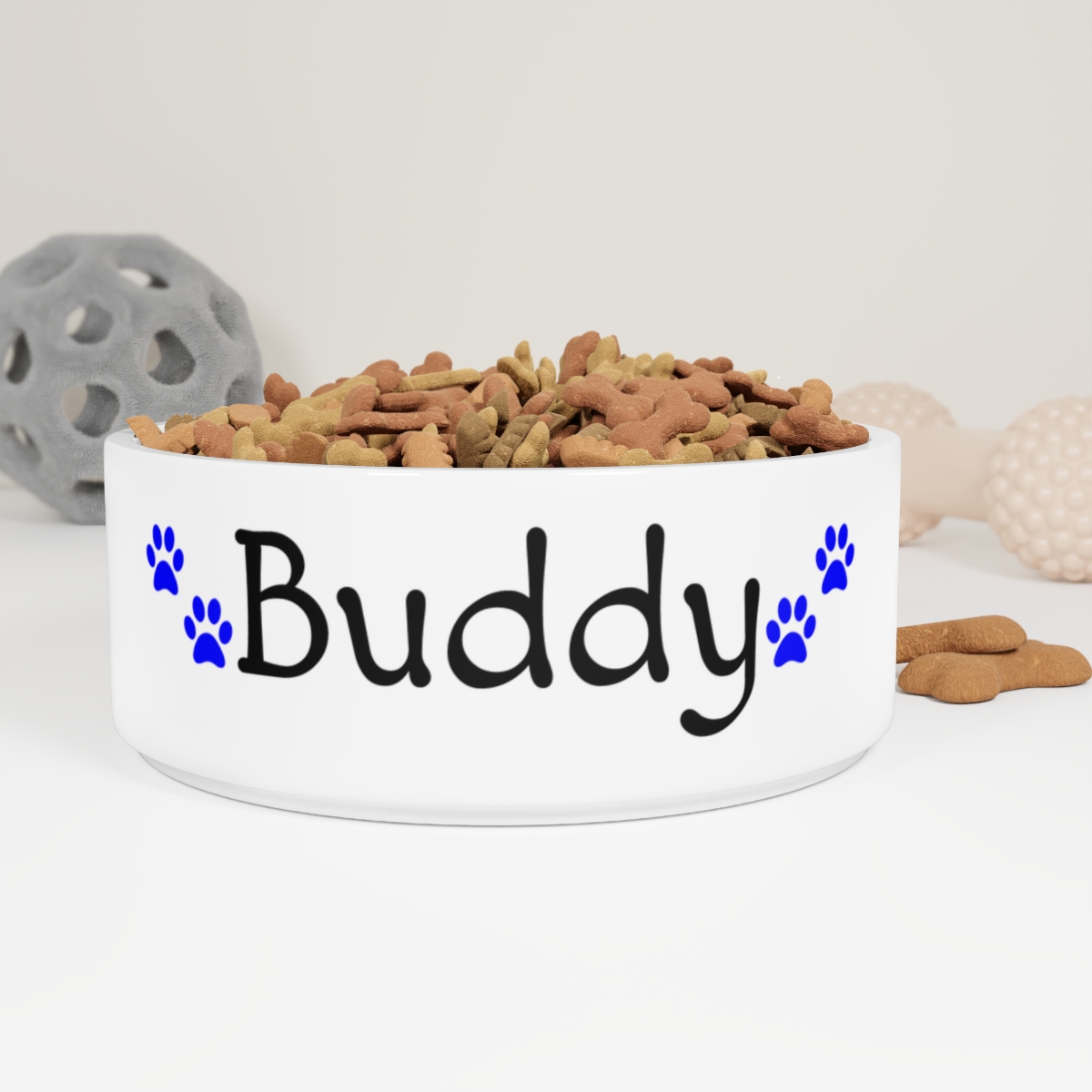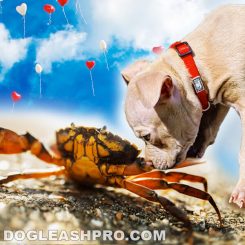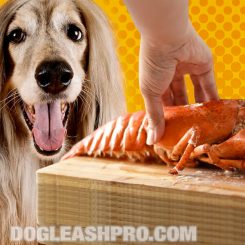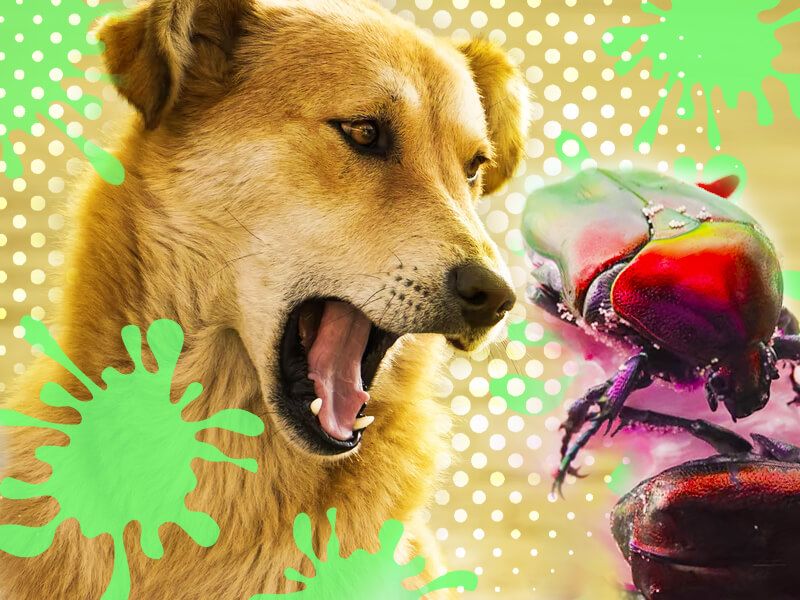
Can dogs eat Bugs? It depends. Most of the time, dogs should not eat Bugs, but it really depends on the Bugs in question. Some Bugs are safe for doggy consumption since they are harmless and do not pose any threat to dogs, however other Bugs may not be toxic but can cause upset stomachs in dogs. Then, there are harmful Bugs that your dogs should avoid since they can cause allergic reactions and spread parasites in dogs.
You’ve probably seen your dogs chasing Bugs on the grass while taking them for a walk. All of a sudden, your fur babies start munching on them which is pretty gross. As you’re pulling your pups away from the Bugs, you wonder, “Can dogs eat Bugs?” If you’ve wondered whether dogs can eat insects, you’ve come to the right place. Here’s the quick answer first.
Table of Contents
Dogs and Bugs: Common Questions
There are many different kinds of household bugs and insects around us depending on where we live – some of the most common house pests we’ve listed below come out at different seasons, while others show up almost daily.
Before we discuss each specific bug and whether your dogs will be safe after eating them (accidentally or not), let’s answer your most pressing questions about dogs and bugs in general.
Do dogs eat Bugs?
Yes, most dogs will naturally eat Bugs since they are instinctually curious about the world around them and like to explore by sniffing, eating, and tasting everything that’s around them.
Whether your furry friends are inside at home or outside in your backyard, when they see a Bug moving, they will become naturally curious and will want to play with the Bugs by pawing at them or even chomping some of them.
Dogs eating Bugs is totally normal because most of the time, it is out of pure curiosity. If you suspect your four-legged friends are eating Bugs because they are sick or not feeling well, we highly recommend that you consult your vet to see if your pooch has any dietary deficiencies.
You may be interested in: Can Dogs Eat Goldfish?
Why do dogs eat Bugs?
You see your dog laying on the floor and playing with Bugs. All of a sudden, he tilts his head and chomps on a few of the Bugs.
Now you’re probably wondering, “Why is my dog eating Bugs?”
Your dogs are eating Bugs because they see Bugs as a small snack or treat that they can also play with. When our furry friends see small critters crawling around, they have a strong desire to play with them by pawing at them and even munching on a few of them.
While we think Bugs are so gross, some dogs see Bugs differently. They simply view Bugs as a delicious treat and some even enjoy the texture and the taste of certain types of Bugs.
Is it safe for dogs to eat Bugs?
Fortunately, most Bugs or insects are fine for dogs to eat. However, there are certain Bugs that are bad for dogs and can even hurt your canine friends. What’s frightening is that some Bugs are actually toxic to dogs.
What Bugs are toxic to dogs?
Bugs that are harmful or toxic to dogs include:
- Ants.
- Asian Lady Beetle.
- Boxelder Bugs.
- Caterpillars.*
- Monarch butterfly caterpillars.*
- Cockroaches.
- Crickets.
- Fireflies.
- Grubs.
- Spiders.**
- Stink Bugs.
- Ticks.
If you see any of the above Bugs, be extra careful and make sure your furry family members stay away from them at all costs.
It can be a bit difficult to remember all of these harmful Bugs. The rule of thumb is that if the Bugs eat poop, then you’ll want to keep them away from your canine friends.
That’s because if your dog eats a Bug that feeds on poop, he may potentially have stomach worms. In the worst-case scenario, getting rid of stomach worms may require surgery.
RELATED: White Specks in Dog Poop (Not Moving) – What Should You Do?
*We’ve listed monarch butterfly caterpillars because they eat milkweed. Milkweed is a wildflower and the sole source of food that all monarch butterflies need. Monarch butterflies also use milkweed as a host plant so that they can lay their eggs there. The larvae also feed on the leaves after they’ve hatched.
However, milkweed is poisonous and extremely dangerous to dogs since ingesting milkweed can harm your dog’s heart.
**We’ve also added spiders to this list because it’s difficult to tell which spider your dog will come across. There are some venomous spiders that are harmful to dogs such as the Brown Recluse spiders and the Black Widows. Dogs that eat these spiders can get very sick so it’s best that your dogs stay away from any and all spiders.
So, should dogs eat Bugs?
Most dogs will naturally eat Bugs on their own when they come across them in your house or outside in your backyard. Chances are that your pooch will munch on a few Bugs without you knowing anyways.
Thankfully, most Bugs are actually harmless to our furry friends. In fact, munching on some could add some protein to your dog’s diet. It’s normal for our canine friends to be curious about the world around them and as dog owners, we should allow them to do just that – explore the world around them.
Bugs your dogs eat and their safety
It’s very natural for dogs to play with the Bugs when they come across them. Your furry friends will naturally want to play with the Bugs and even munch on some of them. Fortunately, most Bugs they come across are fine for them to eat.
Just keep in mind those Bugs we’ve listed above that are harmful (or even toxic) to our four-legged friends.
With that, let’s dive deeper and take a look at some of the most common Bugs or insects we see often or seasonally. We’ll explain whether dogs can eat these Bugs and whether our canine friends will be OK if they ate some Bugs.
There are different kinds of Bugs. Here, we will categorize them into three main groups: crawling Bugs, flying Bugs, and worms.
Crawling Bugs
We’ll first start with the creepy crawlers. While out for a walk, your pooch may come across them. Your canine family members may even find them in their food bowl. Thankfully, most of them are safe if your dog happens to eat them.
However, there are a few that may not be safe for dogs. Let’s find out which ones.
Can dogs eat Cicadas?
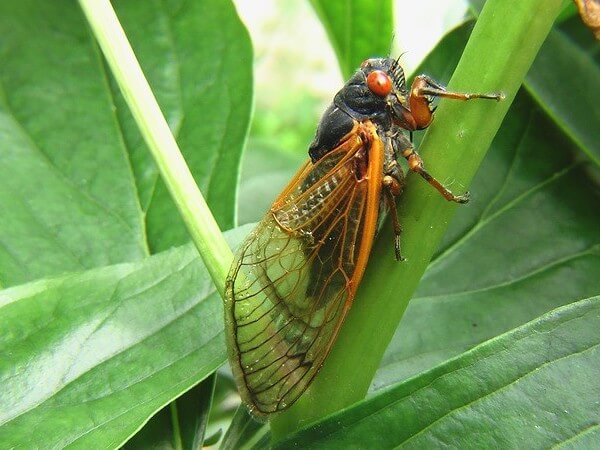
Yes, dogs can eat a few Cicadas since these Bugs are not toxic to dogs. What about Locusts? Can dogs eat Locusts? Yes, dogs can eat Locusts, but it’s best that dogs do not eat a whole bunch of them.
Both Cicadas and Locusts look quite similar and many people are confused between the two. The main difference between Locusts and Cicadas is that Locusts have straight slim bodies while Cicadas have rounded bodies. Locusts are also smaller than Cicadas and their big hind legs are used for leaping.
Additionally, both Cicadas and Locusts produce sounds or noise. However, how they produce the sound differs. Cicadas are known for their loud distinctive sounds. You could say that the Cicadas’ bodies are like musical instruments. How Cicadas produce noise is different from how Locusts produce noises.
While Locusts generate noise by rubbing their wings together or against their bodies, the Cicadas produce a very loud noise by pulling on their tymbals. Cicadas have two tymbals, one located on each side of their abdomen. When Cicadas pull on their tymbals, it causes friction with the ribs on the side of their bodies which produces that noise.
The reason why Cicadas produce louder noise than Locusts is that the back end of their body is hollow which helps to amplify the noise they’re making. Moreover, their wings help to direct the noise in different directions. Male Cicadas make tons of noise in the hope to attract female Cicadas and ultimately uniting with them before dying.
Our canine friends’ ears are very sensitive. In fact, they can hear sounds from 67 Hz to 45,000 Hz while we humans can only hear from about 20 Hz to 20,000 Hz.
Every 17 years, the Cicadas will come out between the months of May and June. When the adult male Cicadas are ready to mate, they’ll make loud noises. This loud noise may also cause some curiosity in dogs as they try to find out where the noise is coming from.
If your canine friends happen to find and eat a Cicada or a Locust, don’t fret. They should be fine.
However, it’s important to note that if Cicadas or Locusts are not part of your dog’s regular diet, then eating a lot of them can cause mild to severe gastrointestinal upset or discomfort.
So, are Cicadas harmful to dogs?
Yes, Cicadas can be harmful to dogs. That’s because the Cicada exoskeletons can be hard to digest and your precious pooch could suffer from serious health issues such as the following if they consume too many Cicadas:
- Vomiting.
- Loose and bloody diarrhea.
- Abdominal pain.
- Severe stomach upset.
- Choke on the hard exoskeleton or choke on the stiff wings.
- Ingest large amounts of pesticides.
- Have an allergic reaction.
If your dog is experiencing the above health issues from eating Cicadas, you’ll want to contact your vet right away. These serious consequences require immediate medical attention and treatment.
Your vet may have to administer intravenous fluids (IV fluids), anti-nausea drugs, gastroprotectants, or pain medications.
Can dogs eat Ants?
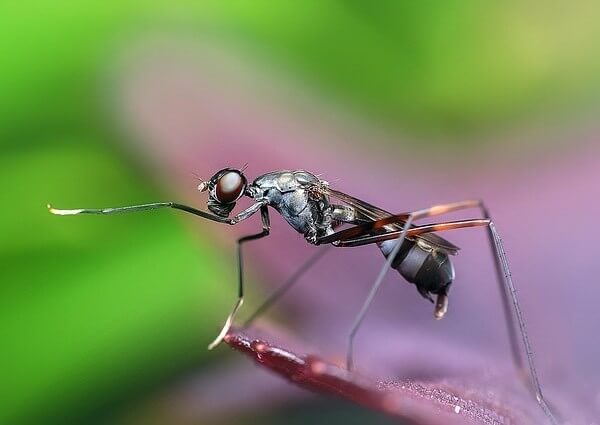
Yes, dogs can eat Ants, however, it’s best to keep your dogs away from fire Ants. That’s because your furry friends could suffer a brutal and painful sting on their lips, tongues, and noses if they try to eat the fire Ants.
However, most Ants, in general, are not toxic or harmful to dogs. In fact, dogs will receive both protein and vitamin C from eating Ants since ants are a wonderful source of protein and quite nutritious for dogs.
I found my dog eating Ants that were in his dog bowl – is this ok?
Ants can enter your home at any time of the year and their job is to find food for the queen Ant. What better way than to go directly to the food source – your dog’s food. Thus, you may find Ants crawling around your dog’s food bowl or inside it.
Will eating Ants hurt my dog?
The good news is that Ants won’t harm your dog and they are safe for doggy consumption. However, when your furry family member notices Ants crawling around in his food, he may not want to eat his food.
So if you notice your pooch isn’t eating his food, make sure to take a look at his dog bowl and see if there are any Bugs or insects inside.
Can dogs eat Cockroaches?
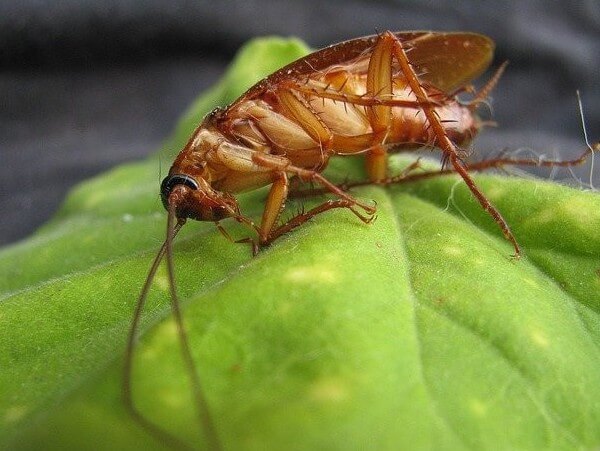
No, dogs should not eat Cockroaches. If you notice Cockroaches crawling around your home, do your best to get rid of them or call a pest control company. You’ll also want to make sure your dogs stay as far away from them as possible.
Do dogs eat Roaches?
Yes, dogs do and will eat Cockroaches if given the chance to do so. Cockroaches are like any other crawly Bugs or insects to our furry friends. Most of the time, our pooch doesn’t really know the difference between each specific type of Bugs.
Due to our K9 friends’ natural prey drive, they will instinctively and automatically chase, play, and munch on any creepy crawlers they find so dog eating Roaches isn’t uncommon.
What if my dog eats a Cockroach?
Fortunately, Cockroaches aren’t poisonous or harmful to dogs. Although dogs may receive protein from eating Roaches, this is highly not recommended.
It’s best that pet owners do not allow their K9 pals to eat Cockroaches since this Bug feeds on feces. When our furry friends play with Roaches and eat them, it can cause stomach worms in dogs.
In addition, Cockroaches can carry bacteria, toxic substances, poison, and even diseases that could harm your furry friend’s health.
If your dog eats a Cockroach, you’ll want to monitor him or her very closely. Some dogs may get sick within 1 to 24 hours after eating a Roach. They may experience symptoms such as:
- Vomiting.
- Digestive upset.
- Upset stomach.
If your pooch shows any of these symptoms, we highly recommend that you contact a vet as soon as possible or reach out to the Pet Poison Helpline.
RELATED: Is Chicken Poop Bad For Dogs?
Can dogs eat Spiders?
No, dogs should not eat Spiders because there are various types of Spiders and some are venomous like the Brown Recluse Spiders and the Black Widows, which are harmful to dogs.
What happens if my dog eats a Spider?
Dogs that accidentally ate a venomous Spider can get quite sick. If you suspect your canine friends are sick from accidentally eating a Spider, we highly recommend that you contact your vet as soon as possible and seek immediate medical attention and treatment.
Other than the venomous Spiders, most Spiders, in general, are relatively harmless to dogs.
However, to err on the side of caution and safety, it’s best to keep your dogs away from any and all Spiders.
Can dogs eat Crickets?
Yes, dogs can eat Crickets. Crickets are safe for dogs to eat and they are packed full of protein and nutrients that are great for your dog’s health.
So, are Crickets good for dogs?
Yes, crickets are good for dogs. Crickets, themselves, contain high levels of protein and they are a great alternative to meat for dogs. Eating a few crickets can help to reduce gut inflammation in dogs.
Best of all, Crickets are crunchy and your dogs will love the texture and taste of this Bug!
My dog ate a Cricket! What should I do?
In most cases, your K9 friend will be fine. However, we do want to point out that some Crickets can carry stomach worm larvae known as Physaloptera spp. Not only can you find these larvae in Crickets, but in other Bugs too such as Cockroaches and beetles.
Dogs that ate a Cricket infected with larvae may experience the following symptoms:
- Vomiting.
- Loss of appetite leading to weight loss.
- Mild gastritis.
- Anemia.
- Bleeding ulcers.
- Melena (dark feces).
At times, your dogs may even throw up immature worms. It’s important to note that some of these symptoms may appear several months after eating the infected Crickets and may not appear right away.
Can dogs eat Grasshoppers?
No, dogs should not eat Grasshoppers. It’s best to keep your K9 pals away from these small Bugs. While your pooch may enjoy playing with them and chasing them, Grasshoppers are not safe for doggy consumption.
If your furry pals happen to eat a Grasshopper or two on rare occasions, then they should be fine. However, Grasshoppers usually like to hop around farmer fields that carry toxic fertilizers and pesticides. When dogs eat Grasshoppers, they second-handedly ingest the toxic fertilizer and pesticides as well.
Some Grasshoppers may even carry roundworms and parasites. For these reasons, it’s best that your dogs don’t eat any Grasshopper.
Can dogs eat June Bugs?
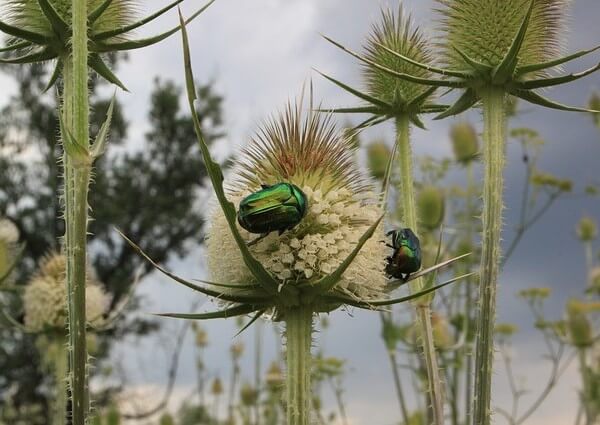
Yes, dogs can safely eat one or two June Bugs on rare occasions. Are June Bugs bad for dogs to eat? Not if your canine pooch only ate one or two June Bugs once in a while.
Are June Bugs poisonous to dogs?
Although June Bugs are not poisonous or harmful to dogs, letting your four-legged friends eat more than two or three June Bugs can cause gastrointestinal upset in dogs as well as the following symptoms:
- Vomiting.
- Diarrhea.
- Upset stomach.
- Intestinal blockage.
Are June Bugs harmful to dogs?
June Bugs are also known as green June beetles or June beetles. They can grow as long as 0.6 to 0.9 inches and have green metallic wings with shiny bright green heads, undersides, and legs. Since the wings aren’t easily digestible, eating several June Bugs can actually cause intestinal blockage in dogs.
In the worst-case scenario, intestinal blockage requires surgery. If you suspect your dog has an intestinal blockage, we highly recommend that you contact your veterinarian as soon as you can as this requires immediate medical attention.
June Bugs are most commonly found in the eastern US and Canada and they love warm weather like the summer season since they thrive in warm areas.
Although these Bugs are considered nocturnal, they love bright lights and are active wherever there is light. If you have security lights on your property or have porch lights and well-lit windows, you can expect to find a crowd of June Bugs there.
For those that live in the state of Oklahoma, you’ll know that June Bugs are pretty common there and they usually start coming out in late April and in May. There are about 40 to 50 species of June Bugs.
It’s important to note that June Bugs are especially attracted to thick lawns with thatch so if your furry friends are hanging out in the backyard during the warm seasons, there’s a high chance that they may be playing with June Bugs and munching on one or two of them. Keep an eye on them and make sure they don’t eat more than a few June Bugs.
Can dogs eat Stink Bugs?
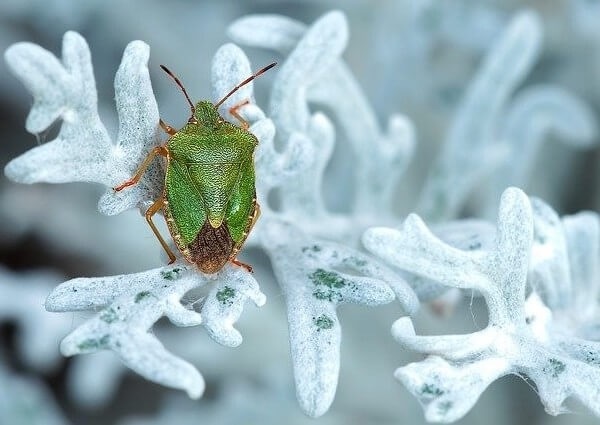
Yes, dogs can safely eat one or two Stink Bugs every once in a while since Stink Bugs are not poisonous to dogs. When dogs find Stink Bugs, they generally enjoy playing with Stink Bugs. Our furry friends will chase them and of course, eat them.
Stink Bugs got their name because they produce an offensive and unpleasant smell in order to deter their prey. Your dogs may bite into one and then naturally become disinterested and leave the Stink Bug alone because of their foul odor and horrible taste.
Are Stink Bugs poisonous to dogs?
Fortunately, Stink Bugs are not poisonous or toxic to dogs.
Do Stink Bugs bite dogs?
No, Stink Bugs do not sting or bite dogs or other animals.
Do Stink Bugs make dogs sick?
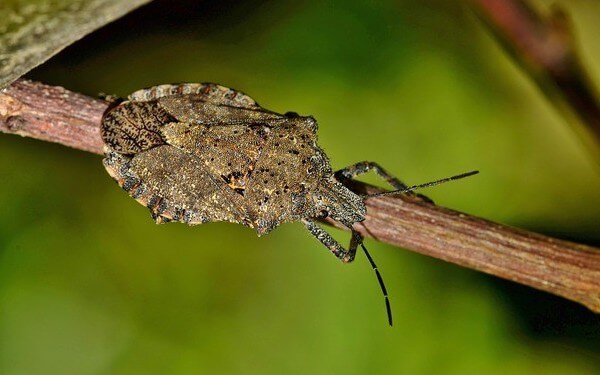
Yes, Stink Bugs can make dogs sick. Some dogs may start to drool excessively and vomit. This is because eating Stink Bugs can irritate your furry friends’ gastrointestinal tract. Luckily, these symptoms aren’t long-term and should go away on their own.
With that said, it’s best that our fur babies stay away from this Bug. Dogs that eat more than one or two Stink Bugs may develop bezoar in their stomach. This is when a hard mass forms in their stomach and prevents what’s in the stomach from passing through to the digestive tract.
The hard mass is usually formed from the hard, indigestible shells of the Stink Bugs.
Most of the time, surgery is required to remove the hard mass or bezoars. If you suspect your pooch has consumed a large number of Stink Bugs, you’ll want to call your vet right away and seek immediate medical attention for your canine friend.
My dog ate a Stink Bug! Should I be worried?
If your dog ate a Stink Bug, don’t fret! As we’ve mentioned above, these Bugs are not toxic or poisonous to dogs, other than their foul secretion and odor.
However, if your pooch experiences any of the below symptoms, we highly recommend that you contact your vet immediately.
Can eating Stink Bugs hurt dogs?
Yes, eating Stink Bugs can hurt dogs. There are cases when dogs start to vomit or have gastrointestinal upset right after eating Stink Bugs due to the malodorous secretion from the Stink Bugs. Luckily, this should resolve on its own over the next 8 to 12 hours.
Dogs that eat Stink Bugs may sometimes experience stinging feelings or pain in their eyes. This usually happens if the secretion gets into their eyes and it can last for a few hours.
It’s important to note that the Stink Bug’s secretions can also irritate your dog’s lips, gum, and tongue, which can cause your pooch to drool excessively.
You can find Stink Bugs on farms and since they are invasive pests, many farmers use insecticides in order to get rid of them. This means that some Stink Bugs may be covered or soaked in insecticide chemicals and dogs that eat them may be in danger since insecticides contain poisonous ingredients.
Can dogs eat Slugs?
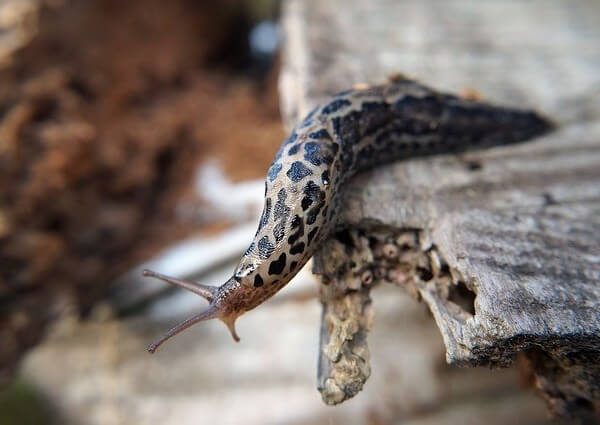
No, dogs should not eat Slugs and dog owners should keep these slimy creatures away from their canine family members at all costs.
Is eating Slugs bad for dogs?
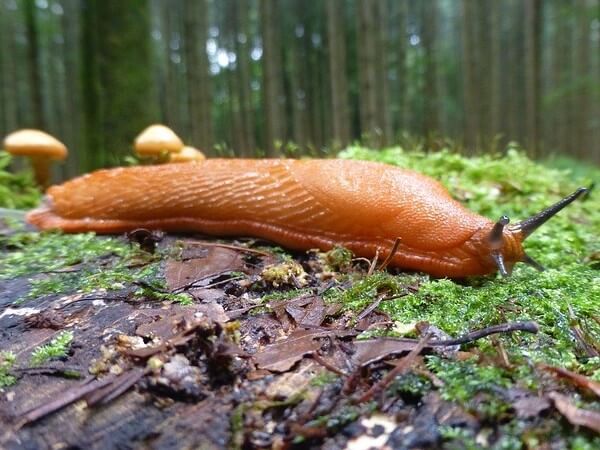
Yes, eating Slugs is bad for dogs because Slugs carry lungworm and there is a high chance that your four-legged friends could contract lungworm simply by licking a Slug infected with this parasite. Once your pooch contracts lungworm, this parasite will attack its lungs and heart blood vessels.
As a result, our precious pooch may get internal hemorrhaging or respiratory disease.
Humans can also contract lungworm. Imagine your dog eating or licking a Slug infected with lungworm and licking your face.
After your K9 friends eat a Slug, they may experience the following signs and symptoms:
- Vomiting.
- Upset stomach.
- Lethargy or fatigue.
- Mucus found around the dog’s mouth.
- Unusual mouth movements.
- Unusual tongue movements.
- Slug slim or pieces found around your dog’s mouth, nose, and paws.
So, can Slugs harm dogs?
As we can see, Slugs can definitely harm our dogs. The good news is that lungworm is easily treatable if caught early so make sure to contact your dog’s vet as soon as you noticed any of the above signs and symptoms. The vet may prescribe treatments like anti-parasitic, which is extremely helpful during the early stages of infection.
Try not to wait too long if you suspect unusual behavior or any of the signs above because this infection can get dangerous and cause permanent damage to your dog’s heart and lung blood vessels.
Are Slugs poisonous to dogs?
Yes, some Slugs are poisonous to dogs, which is another reason why your furry family members should stay away from Slugs. Some Slugs, depending on where they’ve come into contact with, may have ingested slug bait poison. Most farmers and people like you and me may use slug bait poison to get rid of the Slugs from the farm or backyard.
These slug bait poisons contain a chemical called metaldehyde which is lethal since it is a strong neurotoxin.
So, are Slugs poisonous to dogs if eaten?
Yes, dogs that consume Slug with slug bait poisoning may experience metaldehyde poisoning. The following signs and symptoms usually kick in within 1 to 4 hours after ingesting this toxin.
- Vomiting.
- Twitching.
- Tremors.
- Convulsions.
- Diarrhea.
- Anxiety.
- Body collapse.
- Loss of coordination or disorientation.
- Difficulty breathing.
- Panting heavily or breathing very fast.
- Fever.
- Drooling excessively.
- Fast heart rate.
- Sensitive to touch and sound.
- Seizures.
My dog has eaten a Slug! What should I do?
Again, if you notice any of these signs from your pooch, call your vet immediately or contact the Pet Poison Helpline. They are open 24/7 if you’re not able to get a hold of your veterinarian.
Thankfully, Slugs don’t really taste that good. These stinky and slimy creatures are pretty gross! If your K9 friends accidentally ate a Slug or two, the good news is that they will most likely spit it out.
Flying Bugs
Now that we’ve covered the crawly Bugs, what about the Bugs that fly around you and me and our K9 friends? Are flying Bugs and insects safe for dogs to eat? We’ll go over each of these flying Bugs next.
Can dogs eat Flies?
Yes, dogs can eat Flies. There are many different kinds of Flies. There are the regular house Flies you find in your home, fruit flies, drain flies, and more!
If there are Flies flying around your house or in the backyard, you may find your furry friends trying to catch them and swat these flying Bugs with their paws.
Because our fur babies are naturally curious about everything around them, they will continue to play catch with the Flies while the Flies fly around them. When they do swat the Flies with their paws and catch one, it’s natural for dogs to eat them.
Is it ok for dogs to eat Flies?
Yes, thankfully, it is ok for dogs to eat Flies since Flies are safe for doggy consumption. If the flies are an occasional rare meal, then it should be fine for dogs to eat.
However, keep an eye on your pooch and make sure eating Flies doesn’t become a habit.
So, can dogs eat house Flies?
Yes, dogs can eat house Flies as these flying insects pose no threat to your four-legged friends. Just make sure eating house Flies does not become a habit. If your pooch is playing catch with the house Flies and happen to eat one, then your pooch should be fine.
Is it bad for dogs to eat Flies?
While Flies are not toxic or poisonous to dogs, they can be bad for dogs. That’s because Flies are attracted to everything, including poop, rotten food, and any other decaying organic filth.
Some decaying matters like poop may have parasites like tapeworms, roundworms, and hookworms. When the Flies land on the feces that are contaminated with parasites, they can potentially become the new host for these parasites. Once they fly away, they carry these parasites with them.
When your pooch eats a Fly that is contaminated with parasites, he may, unfortunately, become the new host for these nasty parasites. The Flies have transmitted the parasites, like roundworms, hookworms, and tapeworms to your furry friend.
This is why it’s crucial that your canine friends are up to date on all parasite prevention medication. If you’re concerned or have questions about this, we highly recommend that you contact your vet and confirm that your pooch has all his necessary parasite prevention medication.
My dog ate a Fly! What do I do?
If your dog ate a Fly, don’t fret! It’s normal for dogs to explore their natural surroundings and occasionally chomp a Fly midair while playing in your backyard or out for a walk. Make sure you’re keeping a close eye on your pooch when you’re outside.
While Flies won’t hurt or poison your pooch, you’ll still want to supervise them. If you’re worried that your K9 friend may have parasites like tapeworms from the Flies, we highly advised that you consult your vet as soon as you can.
DISCLAIMER: THIS WEBSITE DOES NOT PROVIDE MEDICAL ADVICE
The information, including but not limited to, text, graphics, images and other material contained on this website are for informational purposes only. No material on this site is intended to be a substitute for professional veterinary advice, diagnosis, or treatment. Always seek the advice of your veterinarian or other qualified health care provider with any questions you may have regarding dietary needs.
Resources:
https://en.wikipedia.org/wiki/Insect
https://www.businessinsider.com/bugs-live-inside-you-laying-eggs-wiggling-unde-skin-2019-11

With over five years of specialized experience as an animal writer, my expertise lies in dog nutrition, health, behavior, grooming, and training. I am dedicated to delivering helpful and informative content that caters to the well-being of our furry friends. My primary goal is to empower pet owners with knowledge and ensure our canine companions thrive in health and happiness. In my free time, I love volunteering at local dog rescue centers.
